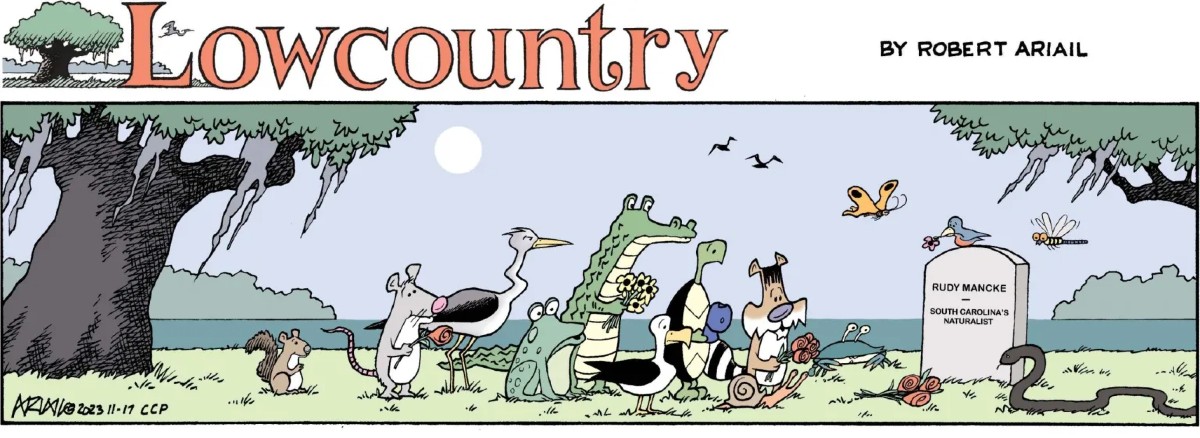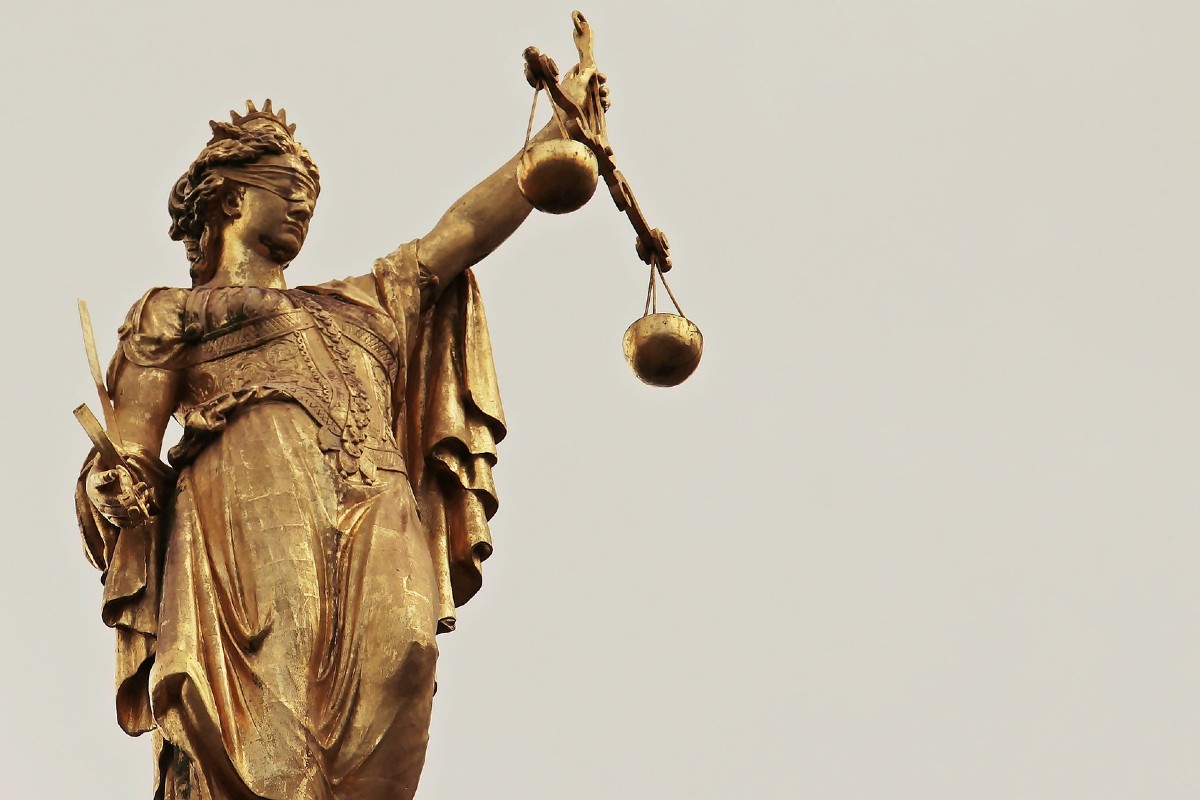STATEHOUSE REPORT | ISSUE 22.46 | Nov. 17, 2023
BIG STORY: Trump still way ahead in S.C.’s 2024 primary, poll shows
NEWS BRIEFS: State education board wants to make decision on limiting books
LOWCOUNTRY, Ariail: Tribute to Rudy
COMMENTARY, Brack: Reform the way S.C. picks judges
SPOTLIGHT: AT&T
MYSTERY PHOTO: What’s this vessel?
FEEDBACK: Send us your letters
Poll: Trump still way ahead in 2024 S.C. primary

By Andy Brack | Despite all of the legal trials and tribulations faced by former President Donald Trump, just over half of South Carolina Republican primary voters prefer him to any of the other candidates in a dwindling GOP presidential field.
A new Winthrop Poll shows Trump is the preferred candidate of 52.2% of Republican voters in the Palmetto State. His next closest challenger with three months left before the February 2024 primary is native daughter and former Gov. Nikki Haley, who was preferred by 16.9% of voters. U.S. Sen. Tim Scott, R-S.C, nabbed 9.7% of GOP support, but he dropped out on the last day of polling. Florida Gov. Ron DeSantis secured support of 11.7% of voters according to the poll of 1,655 voters. An October poll showed similar results.
“Haley continues her steady lead over DeSantis for the distant second choice among South Carolinians,” Winthrop Poll director Scott Huffmon said in a release. “With Tim Scott’s surprising departure from the race, Haley will see how many ‘favorite son’ voters can be converted to ‘favorite daughter’ voters.
“This should give Haley a little more room in seeking non-Trump endorsements from Republican politicians and leaders in the state.”
Other poll results:
 Approval ratings: Among Republicans, Democrats and independents, President Joe Biden got a 31% job approval rating, compared to 36% for U.S. Sen. Lindsey Graham, R-S.C.; 50% for Gov. Henry McMaster; and 52% for Scott.
Approval ratings: Among Republicans, Democrats and independents, President Joe Biden got a 31% job approval rating, compared to 36% for U.S. Sen. Lindsey Graham, R-S.C.; 50% for Gov. Henry McMaster; and 52% for Scott.
Favorability. Haley had a 59% favorability rating among all respondents, compared to 45% for Trump.
Middle East. Two in three of those surveyed said supporting Israel was in the interest of the United States. Just under 60% said their sympathies were more with the Israelis than Palestinians.
Confederate monuments. South Carolinians were split on what to do with monuments or memorials to Confederate soldiers who died in the Civil War. Some 36% said to leave them as they are; 30% said to leave them but add a contextual marker; 22% said they should be moved to a museum; and 8% said they should be removed completely.
Confederate flag. Just over four in 10 respondents said the Confederate flag was a symbol of Southern pride and a third said it represented racial conflict. Twenty percent said it reflected both equally.
- More results: Winthrop Poll.
- Have a comment? Send to: feedback@statehousereport.com
S.C. board wants power to limit books

Staff reports | The State Board of Education is considering a universal definition of “age appropriate” educational materials in South Carolina schools and libraries. Currently, anyone who thinks a book or other material in a school library is inappropriate has to file a complaint with the local school district and board, which decides the matter.
According to the Associated Press, the state board’s maneuver for a new regulation would steer decisions from local to state control. It is “the latest effort from conservative policymakers to restrict public school students’ access to books covering topics of race, gender identity and sexual orientation.”
A vote earlier this week to move the proposal forward was the start of the process. “Final approval is expected to be decided next year before the Republican-led state Legislature can then take up the proposal. A similar bill currently sits in a conference committee of state lawmakers.”
In other South Carolina news:
Newman to step aside as judge for new Murdaugh murder trial. S.C. Circuit Judge Clifton Newman, who presided over Alex Murdaugh’s sensational murder trial this year, has agreed to step aside after the former lawyer and convicted murderer requested a new trial, citing alleged jury tampering by a court clerk. But the state Supreme Court on Thursday refused a request to delay Murdaugh’s Nov. 27 state trial on financial crime charges or to remove Newman from it. Murdaugh was convicted in March in the June 2021 murders of his wife, Maggie, and their son, Paul, after a six-week trial in Colleton County. Newman, who was appointed to handle all of Murdaugh’s cases, presided over that trial and has presided over various hearings related to scores of financial charges Murdaugh also faces.
DHEC move costing S.C. nearly $500M. The breakup of South Carolina’s health and environmental agency into separate divisions and separate addresses is currently underway — but with an expensive price tag.
-
- Related: State plans massive move of state employees from downtown Columbia. Hundreds of state employees are set to move away from their decades-old, rundown Bull Street office locations in downtown Columbia into two different Midlands campuses.
S.C. leaders, utility chiefs look to energy future. Utility officials say that the anticipated growth in the state over the next 10 to 15 years could happen at a faster pace than their ability to generate the needed power.
S.C. restaurant inspections to get farm-to-table makeover. The S.C. Department of Agriculture will start handing out the health and cleanliness grades for restaurants starting in 2024.
S.C. lawmakers launch new effort to target cybercrimes, AI. South Carolina’s General Assembly is forming a standing committee focused on cybercrime and artificial intelligence to help aid the future of technology in the state.
McMaster signs to establish Kinship Guardianship Program. Gov. Henry McMaster recently signed a bill that allows the South Carolina Department of Social Services to create a Kinship Guardianship Program (KinGAP), a judicially created relationship between a youth and a responsible adult that provides an exit to foster care.
S.C. ports gain steam with strong cargo growth. Cargo moving through the Port of Charleston nearly rebounded to pandemic-era highs in October, as a number of inbound containers hit their highest level in a year.
Charleston Southern looks to be first S.C. private college to cover tuition. Charleston Southern University has adopted a program called Buc Promise that makes it the first private school in the state with a tuition guarantee.
S.C. civil rights leaders join call for Brown v. Board name change. Civil Rights protestors have joined a Kershaw County lawyer in filing a petition calling on the Supreme Court to acknowledge the SC lawsuit that spurred school integration, the first of four cases filed that became Brown v. Board of Education.
S.C. gas prices drop another nickel in the past week. The average price for a gallon of gas in South Carolina fell 4.9 cents over the past week down to $2.89 per gallon, according to GasBuddy’s latest survey.
Tribute to Rudy

Award-winning cartoonist Robert Ariail generally has a biting or funny comment about the great state of South Carolina in his weekly cartoon. This week, he pays tribute to naturalist Rudy Mancke, who passed away last week.
- Love the cartoon? Hate it? What do you think: feedback@statehousereport.com.
Reform the way S.C. picks judges

By Andy Brack | Judges in South Carolina are, by their very nature, political creatures. While they’re supposed to be fair, impartial and non-political on the bench, it’s always in the backs of their minds that they got their jobs through a political process.
 “They are aware of the outcome of the last election,” one former senior judge told me this week. Another remarked, “A judge would be foolish not to have his finger in the air and be a judge of the political winds.”
“They are aware of the outcome of the last election,” one former senior judge told me this week. Another remarked, “A judge would be foolish not to have his finger in the air and be a judge of the political winds.”
In some states, judges are elected by voters. Bad idea. Forcing judges to become politicians and to raise money, buy campaign ads, offer political messaging and face voters is a bad idea. It essentially would open them up to all sorts of conflict. Imagine some rich guy or business who gave a $2,000 donation to every judicial candidate. That would be a pretty easy way of creating havoc within the system.
In the federal system, judges are recommended by a senator, nominated by the president and confirmed by the Senate. That’s less political than running for office, but it’s still political because judges nominated by a Democratic president often are pegged as more liberal than those nominated by a GOP president. Would anybody ever accuse three justices nominated by former President Donald Trump – Amy Coney Barrett, Neal Gorsuch or Brett Kavanaugh – of being a closet Democrat?
South Carolina has a hybrid system because it avoids direct popular elections and appointments. Instead, it relies on the principles of representative democracy that allows state lawmakers to pick judges after candidates have been screened and qualified by a panel of lawyers.
The process avoids the politics of statewide or regional campaigning and pitfalls of appointments involving a governor. But on the negative side, there’s still an election – just with a smaller group of people, senators and state representatives.
In South Carolina, the hybrid involves the Judicial Merit Selection Commission, a group of 10 lawyers who screen and qualify lawyers who want to be judges. The Senate and House appoint five members each, including three lawyer-legislators each.
Before 1996, anyone who met constitutional age and residency requirements could be considered by the General Assembly for a judgeship, according to the SC Bar. But that changed with reform that updated the process and gave the responsibility to the JMSC as the body to nominate up to three qualified candidates. According to the SC Bar, “Previously, the review panel did not have authority to remove names from consideration and sent all candidates — qualified or not — to the General Assembly for consideration.”
Some past judges said the limit of three qualified candidates was when more politics got injected into the system by creating legislative pressure on the JMSC to give the nod to some candidates over others.
Now is the time for more judicial reform tweaks to take even more politics out of how lawyers get to the bench. Legislators should update the selection rules to make at least two changes in the coming session.
First, they should get rid of the rule that only three candidates can be qualified and nominated. Let the JMSC do its job and release names of all qualified candidates. Members don’t need to nominate candidates – a political process if there ever were one. Instead, they should give a thumbs up or thumbs down on whether a candidate is qualified to be fair and impartial, politics aside.
Second, the make-up of the commission needs to change. The legislature already has a part in the process – electing judges from a series of qualified candidates. Legislators don’t also need another bite at the apple by being on the screening panel to determine who is qualified. That needs to be left to outside lawyers, who can be recommended by professional legal organizations and appointed by the House and Senate.
Keeping the judiciary as impartial as possible should be number one on the General Assembly’s coming reforms.
Andy Brack is editor and publisher of Statehouse Report and the Charleston City Paper. Have a comment? Send to: feedback@statehousereport.com.
AT&T
 The public spiritedness of our underwriters allows us to bring Statehouse Report to you at no cost. Today’s featured underwriter is AT&T Inc.
The public spiritedness of our underwriters allows us to bring Statehouse Report to you at no cost. Today’s featured underwriter is AT&T Inc.
AT&T Inc. (NYSE:T) helps millions around the globe connect with leading entertainment, mobile, high speed Internet and voice services. We’re the world’s largest provider of pay TV. We have TV customers in the U.S. and 11 Latin American countries. We offer the best global coverage of any U.S. wireless provider*. And we help businesses worldwide serve their customers better with our mobility and highly secure cloud solutions.
- Additional information about AT&T products and services is available at http://about.att.com.
- Follow our news on Twitter at @ATT, on Facebook at http://www.facebook.com/att and YouTube at http://www.youtube.com/att.
* Global coverage claim based on offering discounted voice and data roaming; LTE roaming; voice roaming; and world-capable smartphone and tablets in more countries than any other U.S. based carrier. International service required. Coverage not available in all areas. Coverage may vary per country and be limited/restricted in some countries.
What’s this vessel?

Here’s a ship that may or may not have ties to South Carolina. What is it? Send us your guess of what this photo shows – as well as your name and hometown – to feedback@statehousereport.com.
 Last week’s “Is this just a field?” was, in fact, more than just a field (which you probably figured out even if you didn’t know what it was.) The image shows a side view of the Star Fort at Ninety Six National Historic Site in Greenwood County.
Last week’s “Is this just a field?” was, in fact, more than just a field (which you probably figured out even if you didn’t know what it was.) The image shows a side view of the Star Fort at Ninety Six National Historic Site in Greenwood County.
Allan Peel of San Antonio, Texas, sent along this information about the site: “According to the National Park Service web site here, “construction of the Star Fort started in December 1780 and finished in early 1781. It was built by Loyalist soldiers (loyal to the King of England) and slaves from nearby farms and plantations. It wasn’t a very popular design because it was hard to build, and couldn’t hold many troops, but Loyalist engineer Lt. Henry Haldane decided that an eight-point star fort would be better for the site than a traditional square fort. The star shape allowed musket and cannon fire in all directions.”
Others who correctly identified the fort were: George Graf of Palmyra, Va.; Bill Segars of Hartsville; Vicki Acker of Spartanburg; John Hart, Elizabeth Jones, Sally Foster and Jay Altman, all of Columbia; Pat Keadle of Wagener; and Daniel Prohaska of Summerville.
- Send us a mystery picture. If you have a photo that you believe will stump readers, send it along (but make sure to tell us what it is because it may stump us too!) Send to: feedback@statehousereport.com and mark it as a photo submission. Thanks.
Send us your thoughts
We encourage you to send in your thoughts about policy and politics impacting South Carolina. We’ve gotten some letters in the last few weeks – some positive, others nasty. We print non-defamatory comments, but unless you provide your contact information – name and hometown, plus a phone number used only by us for verification – we can’t publish your thoughts.
- Have a comment? Send your letters or comments to: feedback@statehousereport.com. Make sure to provide your contact details (name, hometown and phone number for verification. Letters are limited to 150 words.
- ORDER NOW: Copies are in Lowcountry-area bookstores now, but if you can’t swing by, you can order a copy online today.
- Now available as an e-book!
ABOUT STATEHOUSE REPORT
Statehouse Report, founded in 2001 as a weekly legislative forecast that informs readers about what is going to happen in South Carolina politics and policy, is provided to you at no charge every Friday.
- Editor and publisher: Andy Brack, 843.670.3996
Donate today
We’re proud to offer Statehouse Report for free. For more than a dozen years, we’ve been the go-to place for insightful independent policy and political news and views in the Palmetto State. And we love it as much as you do.
But now, we can use your help. If you’ve been thinking of contributing to Statehouse Report over the years, now would be a great time to contribute as we deal with the crisis. In advance, thank you.
Buy the book
Now you can get a copy of editor and publisher Andy Brack’s We Can Do Better, South Carolina! ($14.99) as a paperback or as a Kindle book ($7.99). . The book of essays offers incisive commentaries by editor and publisher Andy Brack on the American South, the common good, vexing problems for the Palmetto State and interesting South Carolina leaders.
More
- Mailing address: Send inquiries by mail to: P.O. Box 21942, Charleston, SC 29413
- Subscriptions are free: Click to subscribe.
- We hope you’ll keep receiving the great news and information from Statehouse Report, but if you need to unsubscribe, go to the bottom of the weekly email issue and follow the instructions.
- Read our sister publication: Charleston City Paper (every Friday in print; Every day online)
- © 2023, Statehouse Report, a publication of City Paper Publishing, LLC. All rights reserved.


